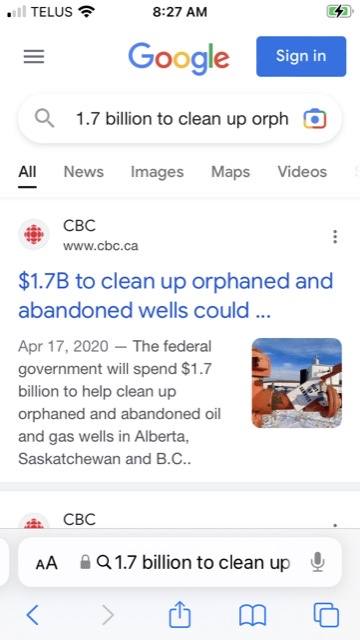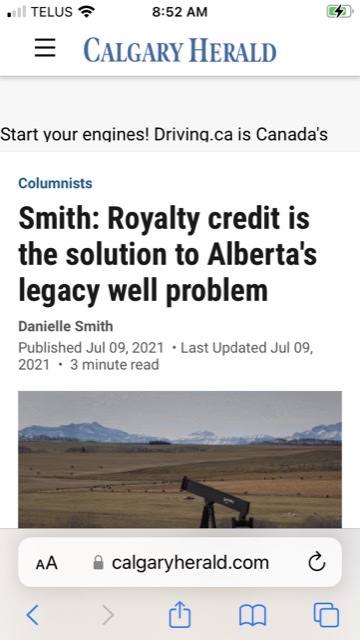https://www.theglobeandmail.com/opinion/editorials/article-danielle-smiths-corporate-welfare-for-the-oil-industry/
opinion
Danielle Smith’s corporate welfare for the oil industry
The Editorial Board
Published Yesterday
Alberta Premier Danielle Smith wants to clean up old wells, ones that haven’t produced any oil or natural gas for decades yet still blight the province’s landscape.
She’s got the right goal in mind – industry has been far too slow remediating old wells – but where Ms. Smith goes wrong is the proposed method. The Premier wants to give owners of inactive wells breaks on royalty payments on new wells they drill, in exchange for dealing with the old wells. The plan is corporate welfare, with Albertans bearing the cost of the private sector’s unfulfilled obligations and cleaning up the mess left behind after profits are extracted.
Let’s say we flip around the idea. Yes, Alberta can use public money to clean up the oldest wells – but, then, instead of reducing royalties paid by those producers, increase the royalties bill owed to the province from oil and gas companies to cover the cost of remediating old wells.
Mind you, our proposal is a little mischievous but it underlines the fact more needs to be done to clean up old wells – not by taxpayers but by industry, which took on the obligation when it was granted rights to drill in the first place.
Oil and natural gas are owned by the people of Alberta. The surface land is sometimes owned by the Crown and in many cases privately. Farmland is typical. Companies in the fossil fuel industry bid in provincial auctions to win a lease for the subsurface mineral rights. If they need to drill on private land, a deal is made with the owner. Drilling comes with a promise to remediate the site after the resource is depleted. Royalties on the oil and gas are paid to the province.
Where the system has faltered is on the back end – the cleanup. The situation worsened in recent years. The Globe and Mail in 2018 published an investigation called Hustle in the Oil Patch that looked at the issue of more than 100,000 inactive wells in Western Canada, the bulk in Alberta, and the risk citizens would be saddled with the cleanup bill.
Inactive wells are owned by a company but are not yet remediated. The risk is those become orphan wells, with no corporate owner. The provincial and federal governments have both slung a lot of money at orphan wells in recent years. Ottawa committed $1.7-billion in the early months of the pandemic in 2020, with $1-billion to Alberta, for the cleanup of orphan and inactive wells.
But Ms. Smith isn’t focused on orphans. She proposes to use public money for inactive wells owned by companies still in business. The province can’t give a royalty break to defunct operators. The premier’s plan is egregious in three ways.
First, it is a wholesale violation of the polluter-pay principle. The company that made the mess, and profited from it, has to clean it up.
Second, there is a giant moral hazard. If Ms. Smith subsidizes companies for doing what they’ve already promised, why would other companies who are currently living up to their obligations continue doing so? They’d basically be suckers, if the province was ready to foot the bill.
Third, Ms. Smith’s role is problematic. Before she became premier, she was an industry lobbyist who pitched government on this concept – a pitch that was rejected by the United Conservative Party government she now leads.
And that’s the simple answer: reject the plan again.
Ms. Smith’s idea is a $100-million pilot project and on Wednesday afternoon she said consultations would take several months. It should have never been tabled. Bank of Nova Scotia this month showed the “biggest beneficiaries†would be some of the largest companies in the industry and said the plan violates “the core capitalist principle that private companies should take full responsibility for the liabilities they willingly accept.†And given booming oil profits, there’s never been a better time to deal with old problems.
What Alberta should do is further strengthen its cleanup rules. Other places, like British Columbia, have deadlines to remediate wells. Alberta has a minimum annual level of industry spending on old wells, $700-million for 2023.
The work to ensure old wells are cleaned up sets a standard for extraction industries across Canada. In the decades ahead, as mining for critical minerals increases, governments need to make sure that, eventually, companies pay the costs to shut down such mines. Think of the oil sands, the vast areas that will need to be remediated.
In every case, the polluter-pay principle is key: It cannot be capitalism for profits and socialism for costs.
opinion
Danielle Smith’s corporate welfare for the oil industry
The Editorial Board
Published Yesterday
Alberta Premier Danielle Smith wants to clean up old wells, ones that haven’t produced any oil or natural gas for decades yet still blight the province’s landscape.
She’s got the right goal in mind – industry has been far too slow remediating old wells – but where Ms. Smith goes wrong is the proposed method. The Premier wants to give owners of inactive wells breaks on royalty payments on new wells they drill, in exchange for dealing with the old wells. The plan is corporate welfare, with Albertans bearing the cost of the private sector’s unfulfilled obligations and cleaning up the mess left behind after profits are extracted.
Let’s say we flip around the idea. Yes, Alberta can use public money to clean up the oldest wells – but, then, instead of reducing royalties paid by those producers, increase the royalties bill owed to the province from oil and gas companies to cover the cost of remediating old wells.
Mind you, our proposal is a little mischievous but it underlines the fact more needs to be done to clean up old wells – not by taxpayers but by industry, which took on the obligation when it was granted rights to drill in the first place.
Oil and natural gas are owned by the people of Alberta. The surface land is sometimes owned by the Crown and in many cases privately. Farmland is typical. Companies in the fossil fuel industry bid in provincial auctions to win a lease for the subsurface mineral rights. If they need to drill on private land, a deal is made with the owner. Drilling comes with a promise to remediate the site after the resource is depleted. Royalties on the oil and gas are paid to the province.
Where the system has faltered is on the back end – the cleanup. The situation worsened in recent years. The Globe and Mail in 2018 published an investigation called Hustle in the Oil Patch that looked at the issue of more than 100,000 inactive wells in Western Canada, the bulk in Alberta, and the risk citizens would be saddled with the cleanup bill.
Inactive wells are owned by a company but are not yet remediated. The risk is those become orphan wells, with no corporate owner. The provincial and federal governments have both slung a lot of money at orphan wells in recent years. Ottawa committed $1.7-billion in the early months of the pandemic in 2020, with $1-billion to Alberta, for the cleanup of orphan and inactive wells.
But Ms. Smith isn’t focused on orphans. She proposes to use public money for inactive wells owned by companies still in business. The province can’t give a royalty break to defunct operators. The premier’s plan is egregious in three ways.
First, it is a wholesale violation of the polluter-pay principle. The company that made the mess, and profited from it, has to clean it up.
Second, there is a giant moral hazard. If Ms. Smith subsidizes companies for doing what they’ve already promised, why would other companies who are currently living up to their obligations continue doing so? They’d basically be suckers, if the province was ready to foot the bill.
Third, Ms. Smith’s role is problematic. Before she became premier, she was an industry lobbyist who pitched government on this concept – a pitch that was rejected by the United Conservative Party government she now leads.
And that’s the simple answer: reject the plan again.
Ms. Smith’s idea is a $100-million pilot project and on Wednesday afternoon she said consultations would take several months. It should have never been tabled. Bank of Nova Scotia this month showed the “biggest beneficiaries†would be some of the largest companies in the industry and said the plan violates “the core capitalist principle that private companies should take full responsibility for the liabilities they willingly accept.†And given booming oil profits, there’s never been a better time to deal with old problems.
What Alberta should do is further strengthen its cleanup rules. Other places, like British Columbia, have deadlines to remediate wells. Alberta has a minimum annual level of industry spending on old wells, $700-million for 2023.
The work to ensure old wells are cleaned up sets a standard for extraction industries across Canada. In the decades ahead, as mining for critical minerals increases, governments need to make sure that, eventually, companies pay the costs to shut down such mines. Think of the oil sands, the vast areas that will need to be remediated.
In every case, the polluter-pay principle is key: It cannot be capitalism for profits and socialism for costs.


Comment